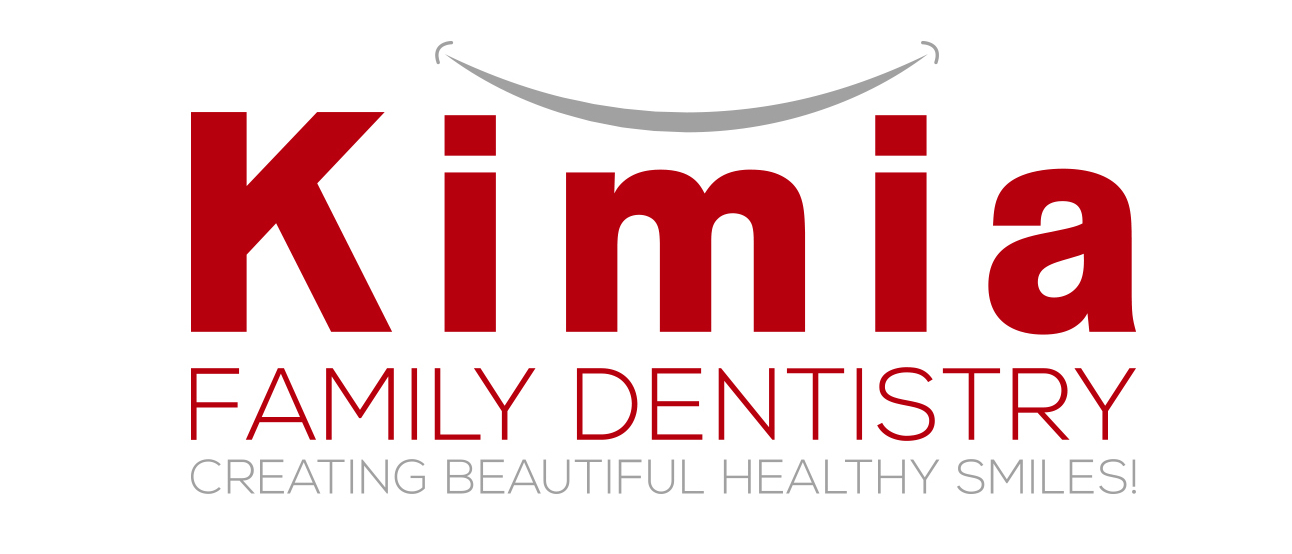LANAP Protocol
The LANAP protocol is a laser-based treatment for gum disease. There is no
cutting and suturing with the LANAP protocol. Patients typically report less pain
and discomfort during and after the procedure, compared to traditional
periodontal surgery. This patient friendly procedure helps you get healthy again
comfortably, without fear. Generally, the LANAP protocol is less invasive than
traditional surgery and helps maintain a beautiful smile line
The LANAP protocol is a patented periodontal treatment, cleared by the FDA in
2004. The procedure can only be done with the PerioLase® MVP-7; this laser
operates at a specific wavelength that attacks the bacteria that contributes to
gum disease while leaving healthy tissue intact. Post-surgical recession and
tooth sensitivity, which can be significant following traditional gum surgery, are
also greatly reduced.

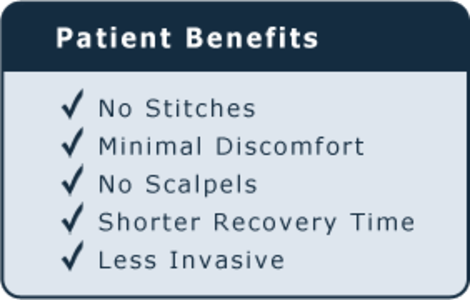
Patient Benefits:
Faster Healing – LANAP® treatment is minimally invasive and allows the body
to recover and heal more quickly.
Less Discomfort – Patients report less discomfort during and after surgery.
No Cut, No Sew, No Fear – the LANAP protocol uses laser light energy to
eliminate the bacteria that cause gum disease, and help your mouth recover
faster
Minimal Recovery Time – Most patients can immediately return to their daily
routine.
Little to No Gum Recession – Because the procedure doesn’t require cutting
the gums, there is less risk of recession and your beautiful smile is maintained.
Reduction in Gum Inflammation and Bleeding – The PerioLase® MVP-7™
targets inflammatory bacteria without injuring healthy tissue.
Saves Teeth – Patients can keep their natural teeth sometimes even when the
teeth have been deemed ‘hopeless’ with traditional treatments. Keeping your
natural teeth has been linked to a longer lifespan!
Safe for patients with Health Concerns –LANAP® protocol is safe for patients
with health concerns such as diabetes, HIV, hemophilia, or those taking
medications such as Plavix or aspirin.
About Gum Disease
What Is Gum Disease?
Gum disease begins when a film called plaque accumulates on the teeth and calcium from saliva hardens the plaque—this calcified plaque is called tartar or calculus. Certain types of germs that live in this plaque and calculus damage gum tissue. Your body tries to fight this infection with an inflammatory attack, sending white blood cells to the area to destroy the bacteria. This inflammation causes the tissue to bleed easily when you brush
or floss. This stage of the condition is called gingivitis. If the infection and inflammation persist the result is a chronic inflammatory condition
where, in addition to the gums, ligament and bone around the teeth are destroyed—often with no symptoms. At this stage it is called periodontitis.
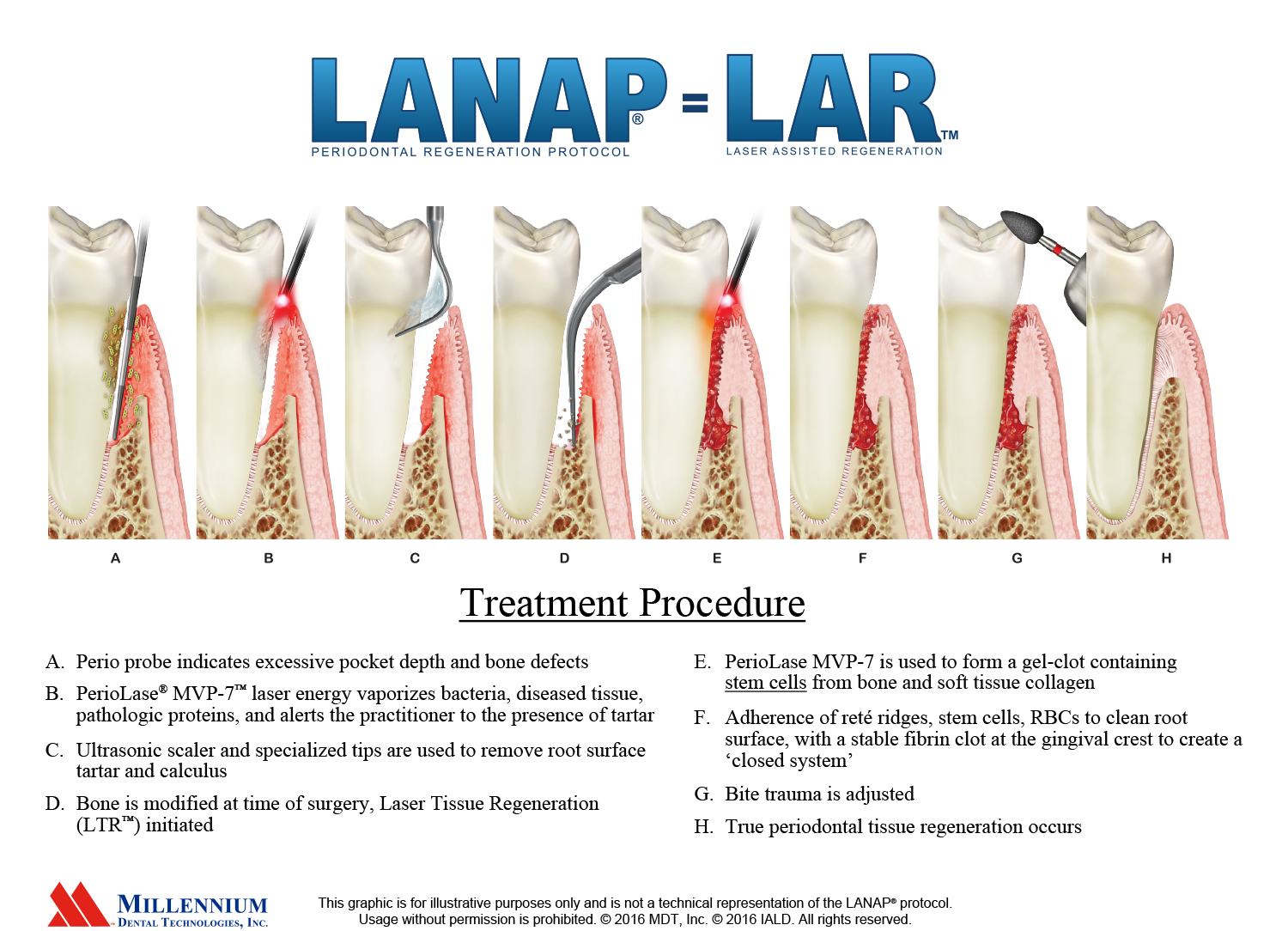
Signs/Symptoms of Moderate-Advanced Gum Disease Include:
• Gums that are red, swollen, and bleed easily
• Gums that seem to have pulled away from the teeth
• Bad breath or halitosis
• Pus between your teeth and gums
• Teeth that seem to be loose or moving away from one another
• Change in the way your teeth fit together when you bite
• Change in the way your partial denture or implant-supported restorations fit
• Or no symptoms at all!
What Are the Risk Factors for Gum Disease?
Well known risk factors for periodontitis include genetics, stress, avoiding the dentist, no brushing or flossing, and some medical conditions. Smokers are significantly more likely to develop gum disease than non-smokers. It’s not just about your teeth anymore — gum disease has been linked to numerous health problems, with new studies emerging all the time linking oral and overall health.
• ALZHEIMER’S DISEASE
• STROKE
• RESPIRATORY DISEASE
• BREAST CANCER
• HEART DISEASE
• PREGNANCY COMPLICATIONS
• KIDNEY CANCER
• RHEUMATOID ARTHRITIS
• PANCREATIC CANCER
• BLOOD CANCER
• DIABETES
• OSTEOPOROSIS
Related Blog
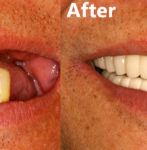
How To Know If You’re A Good Candidate For A Full Mouth Rehabilitation
A dentist Granada Hills is focused on making sure that everyone has the best smile possible. However, a healthy mouth is one of the keys to a beautiful smile. There are a variety of services that can be used to improve your smile including full mouth rehabilitation in Granada Hills. It is also known as … Continue reading "How To Know If You’re A Good Candidate For A Full Mouth Rehabilitation"Read More »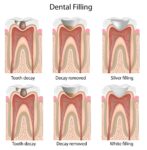
How Long Do Composite Fillings Last?
If you have ever considered getting composite fillings in Granada Hills, then there are a couple things you must know. Cavities are never fun, but with the help of a credible dentist skilled in composite fillers, you’ll be able to overcome the pain with no problem. How this treatment works is simple; the destroyed parts … Continue reading "How Long Do Composite Fillings Last?"Read More »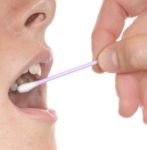
Why You Should Get an Oral Cancer Screening
Oral cancer is another type of cancer that is gaining in cases. Just as you would take proper preparation to protect against prostate cancer or breast cancer, you should do so with oral cancer screenings. If you’re not familiar with what these are, we’re going to go into some detail about the process so you … Continue reading "Why You Should Get an Oral Cancer Screening"Read More »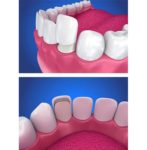
Will Veneers Ruin My Natural Teeth?
Deciding Your Reason for Considering Veneers There are many reasons someone may opt to get porcelain veneers. Mostly, a person will want to brighten their smile. This could be because, over time, enamel on teeth may be worn to the point of a see-through appearance at the bottom cusps. Therefore, they are looking for a … Continue reading "Will Veneers Ruin My Natural Teeth?"Read More »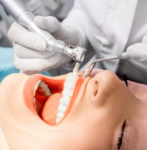
Side Effects Of Teeth Scaling
A dentist Granada Hills may recommend scaling in order to prevent the gums and teeth from developing complications. It is often referred to as root planing. It involves removing plaque that is around the gum pockets. It also removes tartar from the gum line. What Complications Can Result From Scaling? Scaling has more risks than … Continue reading "Side Effects Of Teeth Scaling"Read More »
